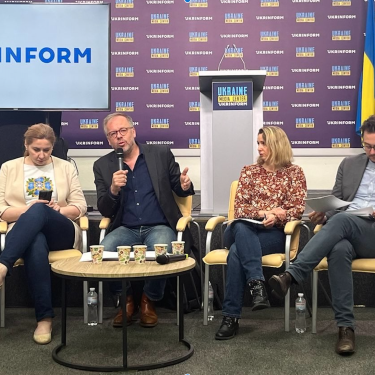RSF provides Zelenskiy with eight-point road-map for strengthening press freedom and reliable reporting in Ukraine

Exactly one year after opening its Press Freedom Centre in the Ukrainian capital, Reporters Without Borders (RSF) held a press conference in Kyiv today (17 May) to unveil a road map for strengthening journalism in Ukraine. RSF has submitted its proposals to the president’s office, culture ministry and prosecutor-general’s office.
The head of the Institute for Mass Communication (IMI), RSF’s partner organisation in Ukraine, and the president of the oversight board of Ukraine’s public broadcaster, Suspilne, were among those attending the press conference at the headquarters of the Ukrainian news agency Ukrinform, at which RSF urged the Ukrainian authorities to implement its eight-point proposal for reinforcing journalistic independence, pluralism and quality.
The RSF delegation, which arrived in Kyiv on 15 May, has launched “Year Two” of the support it has been providing to journalists and media in Ukraine ever since Russia invaded in February 2022. It has met with aides to President’s Zelenskiy, officials at the culture ministry and prosecutor-general’s office, and with several media outlets, which have expressed a great deal of interest in RSF’s proposal. RSF has also received positive signals from the Ukrainian authorities.
Presented by RSF secretary-general Christophe Deloire at the press conference, the road map’s eight priorities are:
- End arbitrary restrictions and discrimination with regard to media covering the war
- Encourage media pluralism and independence
- Safeguard funding for journalism
- Encourage quality journalism in the digital and economic ecosystems by implementing the Journalism Trust Initiative’s emergency protocol
- Join the International Partnership for Information and Democracy, a multilateral initiative launched by RSF with the aim of devising and implementing democratic safeguards in the digital domain
- Develop and promote the legislation proposed under the name of “system for the protection of democratic information spaces”
- Combat impunity for crimes of violence against journalists by ensuring that this is a priority for the justice system
- Ensure that those responsible for the propaganda that has incited war crimes are brought to justice.
“The situation in Ukraine is historic,” Deloire said. “The globalisation of information, the elimination of intermediaries in the communication space, and the technological means to produce and amplify disinformation provide propaganda with a completely new environment. At the same time, the Russian armed forces are committing war crimes against the media and journalists on an industrial scale. We are impressed by the media’s resilience despite this environment, and we want to help democratic Ukraine to continue on this road, hence our proposals to strengthen its information space.
“With nearly 15,000 journalists accredited to cover the war, media accreditation is a major challenge for the Ukrainian authorities. We call for an official statement and clarification on the lifting of restrictions for journalists’ accreditations at the front line, and we urge the authorities to combat against any discrimination against media outlets.”
The head of the Journalism Trust Initiative (JTI), Thibaut Bruttin, unveiled the JTI emergency protocol that is being implemented in partnership with NewsGuard with the aim of supporting quality news media. This rapid response mechanism aims to help news media in endangered regions such as Ukraine to accelerate their JTI validation and quickly get their NewsGuard reliability rating, thereby allowing advertisers, donors and tech companies to support endangered quality journalism.
During the press conference, IMI director Oksana Romaniuk referred to the challenges that journalists face in Ukraine and paid tribute to all those who have lost their lives in the course of covering Russia’s war of aggression. “We will do everything possible to preserve and develop pluralism in Ukraine, to protect journalists, and to support quality journalism,” she said.
Svitlana Ostapa, the head of the oversight board of Ukraine’s recently created public broadcaster, Suspilne, thanked RSF for all the material assistance it has provided and for its appeal for support for the public broadcaster, “an important element in a democratic society.” She also called for an end to Ukraine’s “national news marathon,” which was needed at the start of the war but no longer was, she said.
In the past year, the Press Freedom Centres that RSF that opened in Lviv and Kyiv in March and May 2022 have enabled RSF and the IMI to assist nearly 1,300 media outlets and journalists (three quarters of them Ukrainian) with their coverage of the war. In February 2023, generators and other energy supply sources were distributed to media outlets to help them keep working through the blackouts resulting from an increase in Russian military strikes on Ukraine’s energy infrastructure.
